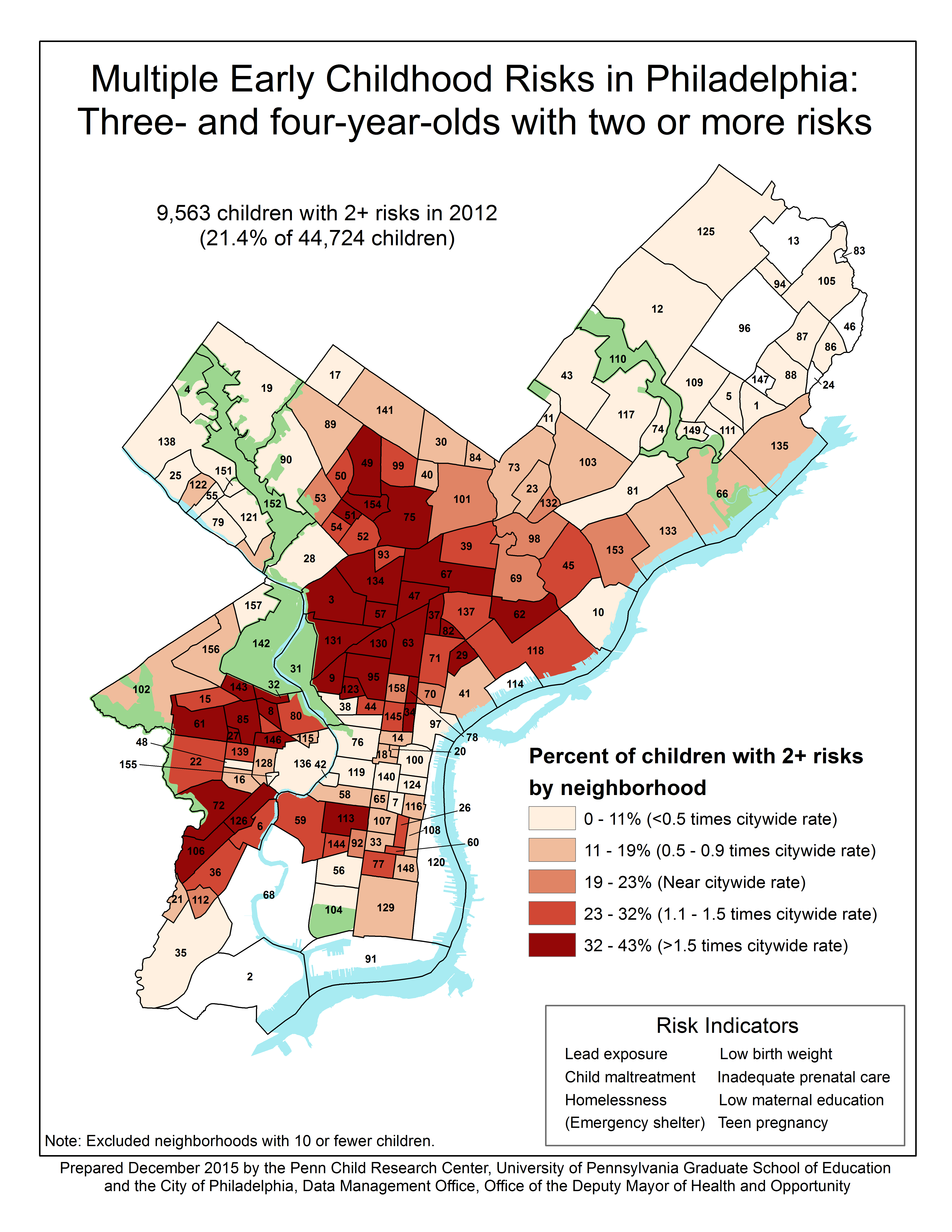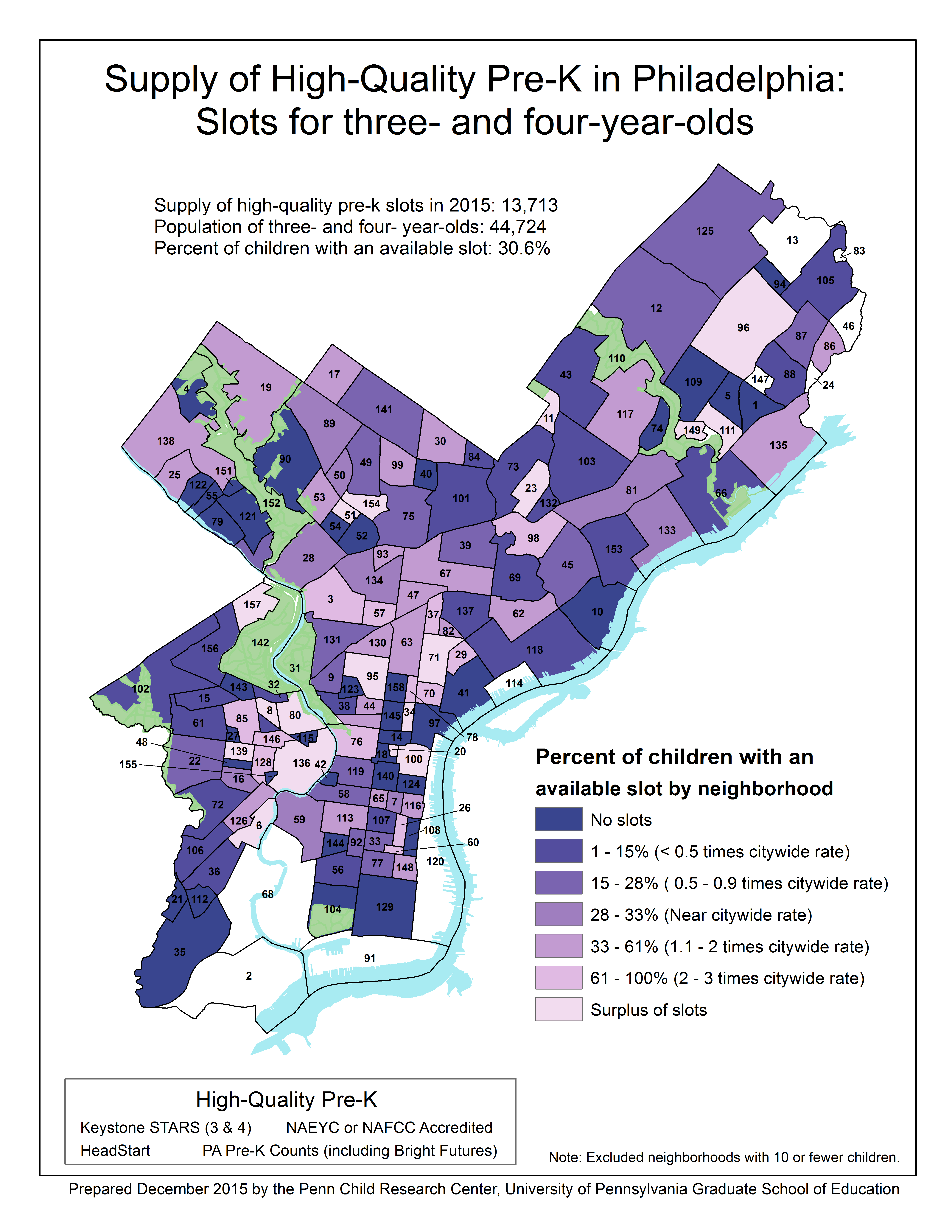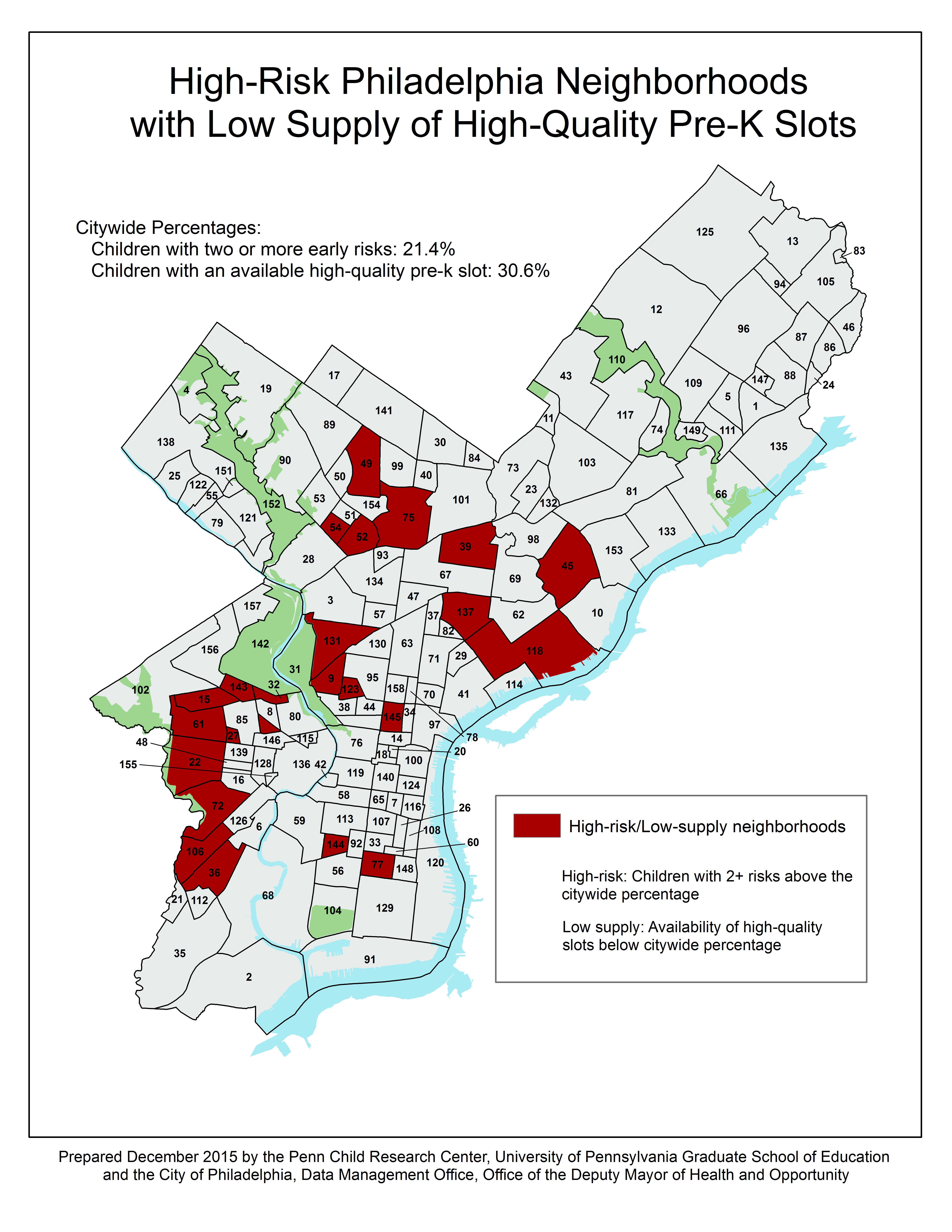Early childhood education has captured the nation’s attention and holds a rare spot in the center of the political aisle.[1] This is not surprising given that a quality Pre-K experience can save the public at least three dollars for every dollar spent, particularly for children who live in poverty and experience numerous risks to their educational success.[2] In Philadelphia, the poorest of the ten largest cities in America, Mayor Kenney built his political campaign on this knowledge and won. Once in office, Kenney established the Commission on Universal Pre-K[3] to expand access to quality Pre-K in the city, with the ultimate goal of universal access for all three- and four-year-old children. This introduced one of the most important decisions in Kenney’s early term as Mayor—how to expand quality Pre-K given limited funds and thousands of children in need. As researchers, the critical question for us became how to provide useful information to Kenney’s Commission in a timely manner so they can allocate funds to serve the most vulnerable children first.
In partnership with the City of Philadelphia’s Data Management Office,[4] the Penn Child Research Center[5] looked to our past research in Philadelphia identifying risks to early school success using the city’s Integrated Data System (IDS). IDS combines data across education, health, and human services (e.g. lead exposure, child maltreatment, homelessness).[6],[7] The power of an IDS is that it allows us to study entire populations across public agencies, longitudinally and in real time, to help support decision making and improve services.
Informed by previous IDS research, Philadelphia prepared this risk data for routine use, and we were able to examine the need for quality Pre-K across the city’s neighborhoods based on the concentration of children with multiple early risks.

[8] We found that 21% of three- and four-year-old children experienced more than one of these early risks. As Figure 1 shows, some Philadelphia neighborhoods had up to 43% of three- and four-year-olds experiencing multiple risks. We then mapped the supply of quality Pre-K slots across the city (see Figure 2), and found that less than one-third of children in Philadelphia could attend a high-quality Pre-K program.This combination of early risk factors and Pre-K slot information is shown in Figure 3 and sheds light on 24 neighborhoods with disproportionately high need for—and low supply of – quality Pre-K slots. In a city with the highest level of deep poverty across the nation, allocating scarce resources is no easy task. However, armed with this information, the Commission now had an evidence-based knowledge base on which to develop and implement their Pre-K expansion strategy.

The Mayor’s Commission included the risk and Pre-K slot maps in their plan[9] for spending the initial $60 million allotted for Universal Pre-K, and used the information to (1) give preference to applicants for funds to increase quality slots for children in high-need, low-supply neighborhoods, and (2) reach out to families in high-need neighborhoods. Philadelphia later successfully passed the “soda tax,” designed to raise sustained funds for continued Pre-K expansion.[10] This pioneering funding stream only increases the need for routine updates of the neighborhood risk and supply information in order to maintain an evidence-based approach to the Pre-K expansion rollout. This work showcases the value of an IDS that can be replicated by other large urban centers to make use of evidence-based risks in the expansion of access to quality Pre-K.[11] In a contentious political environment with few opportunities for bipartisan commitments, cultivating evidence-based strategies supports positive change for our young children by assessing current and past risk factors and access, and tracking outcomes in the future.
John Fantuzzo, is the Albert M. Greenfield Professor of Human Relations at the University of Pennsylvania Graduate School of Education and the Faculty Director of the Penn Child Research Center; Katie Barghaus is a Senior Research Associate, Penn Child Research Center; and Whitney LeBoeuf is a Senior Research Associate, Penn Child Research Center.
[1] Bustamante, Hirsh-Pasek, Vandell, & Golinkoff. (2017). Why DeVos should embrace early childhood education. Brookings Institute. Retrieved February 27, 2017 from https://www.brookings.edu/blog/education-plus-development/2017/02/09/wh….
[2] Yoshikawa, Weiland, Brooks-Gunn, Burchinal, Espinosa, Gormley, et al. (2013). Investing in our future: The evidence base on preschool education. Society for Research in Child Development. Retrieved February 27, 2017 from https://www.fcd-us.org/assets/2016/04/Evidence-Base-on-Preschool-Educat….
[3] Philadelphia’s Commission on Universal Pre-K (http://www.phila.gov/universalprek/Pages/default.aspx).
[4] The City of Philadelphia’s Data Management Office, Office of Deputy Managing Director of Health and Human Services (http://www.phila.gov/hhs/data/Pages/default.aspx).
[5] Penn Child Research Center (http://www2.gse.upenn.edu/child/home). The authors would like to thank Kristen Coe, Cassandra Henderson, and Benjamin Brumley for providing exceptional research assistance on this project.
[6] Rouse, Fantuzzo, & LeBoeuf. (2011). Comprehensive challenges for the well being of young children: A population-based study of publicly-monitored risks in a large urban center. Child Youth Care Forum, 40, 281–302.
[7] Fantuzzo, LeBoeuf, & Rouse (2013). An investigation of the relations between school concentrations of student risk factors and student educational well-being. Educational Researcher, 43(1), 25-36.
[8] Penn Child Research Center and the City of Philadelphia, Data Management Office, Deputy Mayor’s Office for Health and Opportunity. (2016). Examining Multiple Early Childhood Risks in Philadelphia. Retrieved February 27, 2017 from http://www.aisp.upenn.edu/wp-content/uploads/2015/06/Philadelphia_Early….
[9] Philadelphia Commission on Universal Pre-Kindergarten. Final Recommendations Report. Retrieved February 28, 2017 from http://www.phila.gov/universalprek/Documents/Recommendations%20Report.p….
[10] Nadolny. (2016). Soda tax passes; Philadelphia is first big city in nation to enact one. The Philadelphia Inquirer. Retrieved February 27, 2017 from http://www.philly.com/philly/news/politics/20160617_Philadelphia_
City_Council_to_vote_on_soda_tax.html.
[11] Actionable Intelligence for Social Policy (AISP) is a national network of IDS directed by Dennis Culhane and John Fantuzzo at the University of Pennsylvania (https://www.aisp.upenn.edu/).



